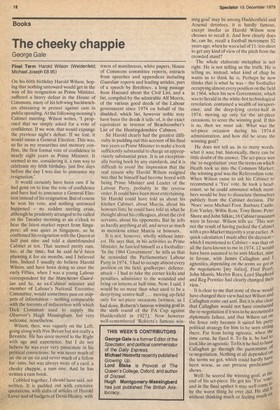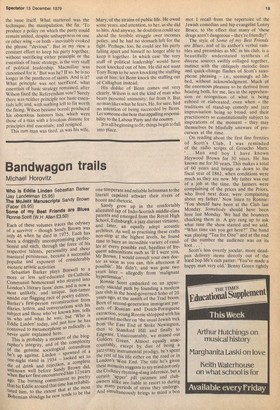The cheeky chappie
George Gale
Final Term Harold Wilson (Weidenfeld; Michael Joseph £8.95) On his 60th birthday Harold Wilson, hoping that nothing untoward would get in the way of his resignation as Prime Minister, suffered a heavy defeat in the House of Commons, many of his left-wing backbenchers abstaining in protest against cuts in public spending. At the following morning's Cabinet meeting, Wilson writes, `I proposed that we simply asked for a vote of confidence. If we won, that would expunge the previous night's defeat. If we lost, it would mean a General Election. This was, so far as my researches and memory confirm, the first formal vote of confidence in nearly eight years as Prime Minister. It seemed to me, considering it, a rum way to celebrate my 60th birthday, just five days before the day I was due to announce my resignation.'
It would certainly have been rum if he had gone on to lose the vote of confidence and have had to announce a General Election instead of his resignation. But of course he won his vote, and nothing untoward happened — no sudden sterling crisis, although he prudently arranged to be called on the Tuesday morning at six o'clock to hear the latest market report from Singapore: all was quiet in Singapore. so he confirmed his resignation with the Queen at half past nine and told a dumbfounded Cabinet at ten. That seemed pretty rum. too, at the time; but he said he'd been planning it for six months, and I believed him. Indeed I usually do believe Harold Wilson, and have been doing so since the early Fifties, when I was a young Labour correspondent for the Manchester Guardian and he, an ex-Cabinet minister and member of Labour's National Executive Committee, would sometimes pass on snippets of information — nothing comparable with the torrents of indiscretion with which Dick Crossman used to supply the Observer's Hugh Massingham, but very welcome, nonetheless.
Wilson, then, was vaguely on the Left. going along with Nye Bevan but not really a Bevanite. He has since moved to the Right with age and experience, but I do not believe he was ever very passionate in his political convictions: he was never much of an -ite or an -ist and never much of a fellow for -isms, but was always more of a card, a cheeky chappie, a rum one. And he has written a rum book.
Cobbled together. I should have said, not written. It is padded out with extensive quotations, with slabs of articles of Harold Lever and of budgets of Denis Healey, with tracts of manifestoes, white papers, House of Commons committee reports, extracts from speeches and appendices including Guardian reports and leading articles, part of a speech by Brezhnev, a long passage from Hansard about the Civil List, and a list, compiled by the admirable Alf Morris, of the various good deeds of the Labour government since 1974 on behalf of the disabled, which list, however noble may have been the deeds it tells I of, is the exact equivalent in interest of Beachcomber's List of the Huntingdonshire Cabmen.
Sir Harold clearly had the greatest difficulty in padding out this account of his final two years as Prime Minister to make a book sufficiently substantial to charge an appropriately substantial price. It is an exceptionally boring book by any standards, and it is difficult to avoid the impression that the real reason why Harold Wilson resigned was that he himself had become bored with being Prime Minister and Leader of the Labour Party, probably in the reverse order. It could have been most entertaining, Sir Harold could have told us about his kitchen Cabinet, about Marcia, about his honours lists; he could have told us what he thought about his colleagues, about the civil servants, about his opponents. But he tells us hardly anything at all, and never so much as mentions either Marcia or honours.
It is not, however, wholly without interest. He says that, in his activities as Prime Minister, he fancied himself as a footballer: In the 1964 Government'. he tells us that he reminded the Parliamentary Labour Party in 1974. 'I had to occupy almost every position on the field. goalkeeper. defence, attack — I had to take the corner kicks and penalties. administer to the wounded and bring on lemons at half-time. Now. I said, I would be no more than what used to be a deep-lying centre-half . . . moving up-field only for set-piece occasions (witness. as I had done, Roberts's famous winning goal in the sixth round of the FA Cup against Huddersfield in 1927).' Now however well-remembered `Roberts's famous win ning goal' may be among Huddersfield and Arsenal devotees, it is hardly famous, except insofar as Harold Wilson now chooses to recall it. And how clearly does he, can he, recall a football movement 52 years ago, when he was a lad of 11. too short to get any kind of view of the pitch from the crowded stand?
The whole elaborate metaphor is not right. He is not telling us the truth. He is telling us. instead, what kind of chap he wants us to think he is. Perhaps he now thinks that is what he was — the footballer occupying almost every position on the field in 1964, when his new Government, which was to herald in the white-hot technological revolution, contained a wealth of inexperi ence, and the deep-lying centre-half in 1974. moving up only for the set-piece occasions, to score the winning goal. If this is so, then we must ask: What was the set-piece occasion during his 1974-6 administration, and how did he score the winning goal?
He does not tell us, in so many words. what it was; but. historically, there can be little doubt of the answer. The set-piece was the 're-negotiation' over the terms on which Heath took us into the Common Market; the winning goal was the Referendum vote. When Wilson came to ask his Cabinet to recommend a 'Yes' vote, he took a headcount, so he could announce which members would be free to dissociate themselves publicly from the Cabinet decision. The 'Noes' were Michael Foot, Barbara Castle. Eric Varley. Willie Ross, Tony Benn, Peter Shore and John Silkin ; 16 Cabinet ministers were in favour. Wilson tells us: 'This was not the result of having packed the Cabinet with a pro-Market majority a year earlier. A quick calculation I made after the decision — which I mentioned to Cabinet — was that on all the facts known to me in 1974. 12 would have been assumed to be anti-Market, nine in favour, with James Callaghan and I agnostics, depending on the terms we got itt the negotiations [my italics]. Fred Peart. John Morris. Merlyn Rees, Lord Shepherd and Reg Prentice had clearly changed their view.' It is clear to me that none of these would have changed their view had not Wilson and Callaghan come out anti. But it is also clear that Callaghan would not have conducted the re-negotiation if it was to be accounted a diplomatic failure, and that Wilson sat on the fence only because it suited his partY political strategy for him to be seen sitting there. Far from being agnostic, when the time came, he fixed it. To fix it, he had to look like an agnostic. To fix it he had to have Callaghan go through the pantomime °I re-negotiation. Nothing at all depended on the terms we got. which could hardly ha", been worse, as our present predicameo' shows. Well: he scored the winning goal. at the. end of his set-piece. He got his 'Yes vot.e0' and in the final upshot it may well come 14 be the worst thing he ever did. He did 1... without thinking much or feeling much 0" the issue itself. What mattered was the technique, the manipulation, the fix. `To produce a policy on which the party could remain united, despite unhappiness on one or other wing — or both — inevitably evoked the phrase "devious". But in my view a constant effort to keep his party together, without sacrificing either principle or the essentials of basic strategy. is the very stuff of' political leadership. Macmillan was canonised for it.' But was he? If so. he is no longer in the pantheon of saints. And is it? What principle was not sacrificed, what essentials of basic strategy remained, after Wilson fixed the Referendum vote? Surely there was neither principle nor basic essentials left; and, with nothing left to fix worth the fixing. Wilson became bored; produced his obnoxious honours lists, which were those of a man with a frivolous distaste for principles and essentials; and resigned. This rum man was tired. as was his wife. Mary, of the strains of public life. He owed some years. and attention, to her, as she did to him. And anyway, he doubtless could see ahead the terrible struggle over incomes policy, and he had no stomach left for the fight. Perhaps, too, he could see his party falling apart and himself no longer able to keep it together. In which case 'the very stuff of political leadership' would have been knocked out of him. He did not want Tony Berm to be seen knocking the stuffing out of him; let Benn knock the stuffing out of Callaghan instead.
His dislike of Benn comes out very clearly. Wilson is not the kind of man who bears personal animosity: far from it, But no man likes what he fears. He. for sure. had no intention of being succeeded by Benn. Let someone else bear that appalling responsibility to the Labour Party and the country. It is all beginning to fit; things begin to fall into place.



































 Previous page
Previous page